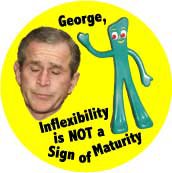11/02/2005
Eastern and western extremism
 Last Friday I took part – with my father – in the symposium: “The reveille of religious extremism”, organized by the study association of philosophy students of the University of Tilburg. It was very interesting and relevant for my dissertation, with a high quality of the lectures, containing nuanced views. The lecturers were among others Donald Loose, Jean-Pierre Wils and Afshin Ellian.
Last Friday I took part – with my father – in the symposium: “The reveille of religious extremism”, organized by the study association of philosophy students of the University of Tilburg. It was very interesting and relevant for my dissertation, with a high quality of the lectures, containing nuanced views. The lecturers were among others Donald Loose, Jean-Pierre Wils and Afshin Ellian.Donald Loose gave a philosophical elaboration on the causes of religious extremism. He made a distinction between “to think” (opinions / views), “to believe” and “to know”. To think and to believe is subjective, to know should be objective. To know if what I believe is true or not, has to be judged at a meta-level, it can’t be judged by me as a subject. So what I believe is just my personal truth, not an absolute truth, or at least I am not able to make that claim because I cannot transcend out of my limited subjective perspective.
 However, this is what extremists cannot accept, that they believe in a random personal truth, not an absolute truth that counts for the whole humanity. There’s a difference between my attitude of how I believe and the content of what I believe in. If I would want to change my religion I could change it completely, in the sense that I stop believing completely, or I could keep my religious attitude and only change the content of what I believe in. When I choose for the last, it is possible to adapt a religion to changing times, without loosing it completely. But an extremist (fundamentalist) will never be willing to change anything; not with regard to his attitude and not with regard to the content of what he believes in either. He will always refuse to be self-critical, to critically reflect on his views and behavior. Any form of doubt should be avoided at all costs.
However, this is what extremists cannot accept, that they believe in a random personal truth, not an absolute truth that counts for the whole humanity. There’s a difference between my attitude of how I believe and the content of what I believe in. If I would want to change my religion I could change it completely, in the sense that I stop believing completely, or I could keep my religious attitude and only change the content of what I believe in. When I choose for the last, it is possible to adapt a religion to changing times, without loosing it completely. But an extremist (fundamentalist) will never be willing to change anything; not with regard to his attitude and not with regard to the content of what he believes in either. He will always refuse to be self-critical, to critically reflect on his views and behavior. Any form of doubt should be avoided at all costs.The more the uncertainty increases, the more the world becomes a global village with modern information technology, a jungle with all kinds of people mixed, with non-transparent chains of causes and effects which are difficult to steer, a world where everything is related and interdependent in a confusing way, and where the borders between good and bad aren’t clearly black and white, but with all kinds of nuances in gray. In such a diffuse and uncertain world people long for the old certainties and a feeling of understanding and safety. People start to long for old times and they want to go back to a pure, authentic and original source. They don’t allow any doubts in their thoughts, they stubbornly want to continue to believe in something that clearly doesn’t fit, that clearly isn’t true. They try to regain an imaginary impossible reality which is unproblematic and clear. People are frustrated that they lost this paradise of certainty and simplicity. They try to appoint a certain group of people as responsible for their frustration. They are the enemies, the evil that has to be conquered. But this mission is in fact doomed to fail, because when the enemy is finally destroyed, the frustration about the uncertainties remains, so it only means that a new enemy has to be created. (The Nazi’s could try to kill every single Jew in the world, but they can never kill the Jew in themselves.)
 This analysis made by Loose is not that surprising or renewing in itself, although I very much appreciated the nuanced, philosophical and well founded way in which he explained his theory. But what stroke me most, was that when I look around me to identify extremists, that many of the elements that Loose described, don’t apply only to e.g. Islamic extremists, but apply just as well to the other side, to the representatives of the so-called “civilized western world”. The people who are so strongly condemning Islamic terrorism, show some of the same characteristics as the people they criticize. They also prefer the familiar old-fashioned world where the borders between good and evil were clear, and where the predictability rate of future events used to be high. They hate this fear of uncertainty, that we can never know which terrorist will attack us where. It could happen anywhere amongst us, anytime.
This analysis made by Loose is not that surprising or renewing in itself, although I very much appreciated the nuanced, philosophical and well founded way in which he explained his theory. But what stroke me most, was that when I look around me to identify extremists, that many of the elements that Loose described, don’t apply only to e.g. Islamic extremists, but apply just as well to the other side, to the representatives of the so-called “civilized western world”. The people who are so strongly condemning Islamic terrorism, show some of the same characteristics as the people they criticize. They also prefer the familiar old-fashioned world where the borders between good and evil were clear, and where the predictability rate of future events used to be high. They hate this fear of uncertainty, that we can never know which terrorist will attack us where. It could happen anywhere amongst us, anytime.  There is no clear war between two armies, there is no cold war either like in the 20th century, this time there is a threat of terror which cannot be grasped at all. This fear and uncertainty makes the Muslim (extremism) haters furious, and as a result they go through a same kind of process as the people whom they hate. They think in absolute black and white (“If you’re not with us you’re against us”), not in different nuances of gray. They long for the old familiar times and they want to go back to their original roots, so they exclude strangers who don’t belong on their ground. They are frustrated and they look for scapegoats which they can blame for their problems, and then they choose foreigners as the scapegoats and enemies who have to be conquered. And just like with the extremists their mission is doomed to fail. Foreigners can be treated inhumane as much as the western extremists like to do that, they can be kicked out of the country, but it doesn’t help at all to decrease the frustrations of the “natives”. Peace and reconciliation between natives and immigrants is impossible then, by definition. Foreigners have to remain enemies for ever, for otherwise there is nobody to let off steam to. And these western extremists are just as reluctant towards self-criticism as their eastern counterparts.
There is no clear war between two armies, there is no cold war either like in the 20th century, this time there is a threat of terror which cannot be grasped at all. This fear and uncertainty makes the Muslim (extremism) haters furious, and as a result they go through a same kind of process as the people whom they hate. They think in absolute black and white (“If you’re not with us you’re against us”), not in different nuances of gray. They long for the old familiar times and they want to go back to their original roots, so they exclude strangers who don’t belong on their ground. They are frustrated and they look for scapegoats which they can blame for their problems, and then they choose foreigners as the scapegoats and enemies who have to be conquered. And just like with the extremists their mission is doomed to fail. Foreigners can be treated inhumane as much as the western extremists like to do that, they can be kicked out of the country, but it doesn’t help at all to decrease the frustrations of the “natives”. Peace and reconciliation between natives and immigrants is impossible then, by definition. Foreigners have to remain enemies for ever, for otherwise there is nobody to let off steam to. And these western extremists are just as reluctant towards self-criticism as their eastern counterparts.  They have a very arrogant attitude towards foreigners. They themselves belong to a normal, civilized, enlightened, intelligent, democratic and just culture / race, while the foreigners belong to a violent, backward, crazy, dumb, totalitarian immoral culture / race. They have to assimilate as soon as possible, or otherwise they should be kicked out of the civilized western world immediately, before they might become too successful with their barbarian infiltration. No way that they would admit that people just believe in what they learned in their youth, that if they would be born in the east they would have completely other ideas that they would consider to be true. There is no way that the perspective of the west would be objectively absolutely true and the perspective from the east completely false, or the other way around. Facts are true or false, opinions and moral judgments are fundamentally subjective. But this idea is for western extremists just as unacceptable as for eastern extremists.
They have a very arrogant attitude towards foreigners. They themselves belong to a normal, civilized, enlightened, intelligent, democratic and just culture / race, while the foreigners belong to a violent, backward, crazy, dumb, totalitarian immoral culture / race. They have to assimilate as soon as possible, or otherwise they should be kicked out of the civilized western world immediately, before they might become too successful with their barbarian infiltration. No way that they would admit that people just believe in what they learned in their youth, that if they would be born in the east they would have completely other ideas that they would consider to be true. There is no way that the perspective of the west would be objectively absolutely true and the perspective from the east completely false, or the other way around. Facts are true or false, opinions and moral judgments are fundamentally subjective. But this idea is for western extremists just as unacceptable as for eastern extremists. So in short the similarities between eastern and western “extremists” are:
So in short the similarities between eastern and western “extremists” are:- A fear of uncertainty, fear of loosing grip
- A longing for their roots, for authenticity and originality
- Black-white simplistic thinking
- Considering your own views as absolute truths and those of other (especially the enemy) as completely false
- Looking for scapegoats who can be blamed personally for anonymous and ungraspable unsolvable problems
 Usually the western extremists don’t commit terrorist attacks, they don’t become suicide bombers. They usually only kill with words (although this doesn’t mean that this way of killing is less dangerous or harmful). And the western extremist politicians kill with inhumane immoral policies towards foreigners, which break with the most elementary international treaties of universal human rights.
Usually the western extremists don’t commit terrorist attacks, they don’t become suicide bombers. They usually only kill with words (although this doesn’t mean that this way of killing is less dangerous or harmful). And the western extremist politicians kill with inhumane immoral policies towards foreigners, which break with the most elementary international treaties of universal human rights. A lot of attention is paid in the western media to the phenomenon of eastern terrorism / extremism, there are many discussions about what should be done to stop eastern extremism. But the extremism at the other side remains almost completely unnoticed / invisible. I find it a frightening idea to think about how much the dominant discourse determines the way individuals define and analyze the problems in society. When in the dominant discourse the problem of western extremism is never mentioned, people don’t realize that it exists, and if this is the case, it’s clear that it’s totally impossible to do something about it. A problem can never be solved if it isn’t recognized as a problem.
A lot of attention is paid in the western media to the phenomenon of eastern terrorism / extremism, there are many discussions about what should be done to stop eastern extremism. But the extremism at the other side remains almost completely unnoticed / invisible. I find it a frightening idea to think about how much the dominant discourse determines the way individuals define and analyze the problems in society. When in the dominant discourse the problem of western extremism is never mentioned, people don’t realize that it exists, and if this is the case, it’s clear that it’s totally impossible to do something about it. A problem can never be solved if it isn’t recognized as a problem. For more anti-Bush buttons, see http://www.toppun.com/anti-bush.htm